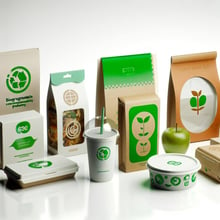
The food industry is undergoing a packaging revolution spurred by ever-growing global concern for sustainability. Far from just addressing environmental concerns, the rise of eco-friendly packaging solutions is driven by a fundamental shift in market landscapes. This blog looks at the growing trend of sustainable packaging across the food sector and discusses its wider implications on the overall industry.
The Growing Demand for Eco-Friendly Packaging

With increased consumer awareness and concern for the environment, there has been a surge in the demand for eco-friendly packaging. Buyers today are more informed and selective, often choosing brands with a view to eco-friendliness. This change in consumer behavior has compelled food companies to rethink their packaging strategies in terms of material use and practices that minimise environmental impact.
Brands are increasingly moving away from traditional plastic packaging, notorious for its environmental footprint, and adopting alternatives like biodegradable and compostable materials. These innovations not only appeal to eco-conscious consumers but also align with the global push towards reducing single-use plastics.
Innovation in Packaging

The growth in environmentally friendly packaging for food has spurred a wave of innovation. The major trends include:
Biodegradable and Compostable Packaging
Materials like polylactic acid (PLA) and cellulose-based films are gaining popularity, offering viable alternatives to conventional plastics. These materials break down naturally, reducing waste in landfills and oceans.
Edible Packaging
This avant-garde method includes packaging that can be eaten along with the food product. Made from natural ingredients like seaweed or potato starch, edible packaging provides a zero-waste solution, ideal for single portions and takeaway foods.
Reusable Packaging
Businesses are exploring reusable packaging models that encourage consumers to return packaging for cleaning and reuse. This model not only reduces waste but also promotes a circular economy where resources are recycled and repurposed.
Market Impact and Competitive Advantage

The shift to sustainable packaging is having a powerful impact on the overall food market. Brands adopting eco-friendly packaging are not just improving their environmental footprint but also gaining a competitive edge. Consumers today are loyal to brands that align with their values, and sustainable packaging is becoming a key differentiator in a crowded marketplace.
Moreover, the cost dynamics of sustainable packaging are evolving. Though once considered more expensive, advancements in technology and increased demand are driving costs down, making sustainable packaging more accessible to a broader range of companies. This democratisation of sustainable packaging is leading to widespread adoption across the food industry, from large multinational corporations to small local businesses.
Regulatory Pressure and Industry Standards

The adoption of sustainable packaging is accelerating due to government regulations. Many countries are implementing bans on single-use plastics and introducing stringent recycling requirements, forcing food companies to innovate. Growing regulatory pressure rewards businesses that proactively adopt sustainable practices as they avoid potential penalties and fines, including non-financial penalties such as reputational damage.
Industry standards are also evolving, with certifications and eco-labels gaining more ground. These certifications not only guide consumer choices but also set benchmarks for companies, ensuring that eco-friendly claims are backed by verifiable third-party practices and accreditations.
Long-Term Sustainability and Brand Reputation

Sustainable packaging is crucial in the long term for building brand equity. Consumers are increasingly holding brands accountable for environmental concerns, and companies that do not adopt sustainable practices may risk losing market share. On the other hand, brands that lead in sustainable packaging are likely to build stronger relationships with their customers and enjoy enhanced brand loyalty.
Moreover, sustainable packaging often carries an association with innovation and quality, enhancing the brand’s value proposition. Investing in eco-friendly packaging not only meets current market demands but also future-proofs businesses against evolving consumer expectations and regulatory landscapes.
Closing Thoughts on Eco-Innovation in the Food Sector
The rise of eco-friendly packaging in the food sector far exceeds a mere trend; it reflects a significant shift in how the industry conducts business in response to market pressures. As consumer concerns about sustainability grow, companies are compelled to innovate and adopt packaging solutions that reduce environmental impact. This shift is not just transforming the food packaging landscape but is also reshaping the competitive dynamics of the market. Brands embracing sustainable packaging are contributing to a healthier planet while positioning themselves for long-term success in an increasingly eco-conscious marketplace. The impact of going green with food packaging is powerful and long-lasting.
To explore Allpack's extensive range of food-safe and efficient packaging solutions, visit www.allpack.uk.com. For questions, contact us at 01543396700 or email our Sales Team at sales@allpack.uk.com. With a wide variety of products and a dedicated customer service team, we’re on hand to support you in transitioning to more sustainable packaging processes.